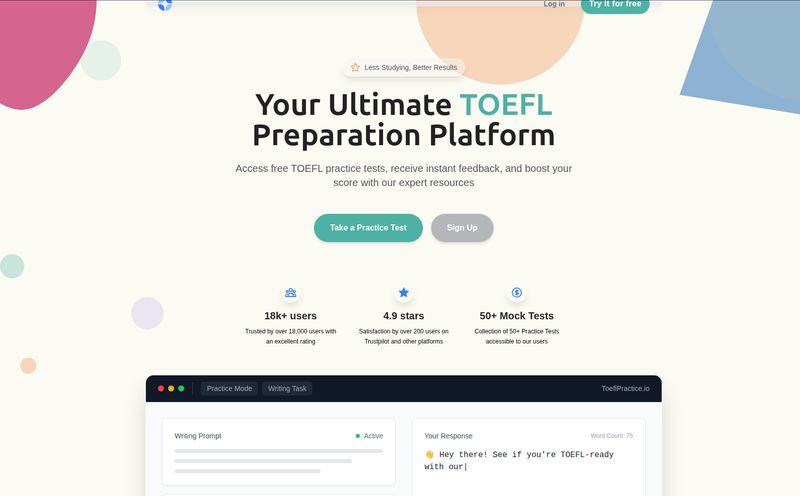How many of us have bought a beautiful, leather-bound journal with the absolute best intentions? You know the one. It’s sitting on your nightstand right now, probably with three entries from January 1st, 2nd, and… maybe the 4th. The pressure of the blank page is a real thing. Staring at it, trying to summon profound thoughts after a long day, can feel more like a chore than a release.
I’ve been in the SEO and digital trends game for years, and I’ve seen a million and one “life-changing” apps. Most of them are just repackaged to-do lists. But every now and then, something pops up that makes me lean in a little closer to my screen. Recently, that something was Momentary AI. It’s a platform built on a simple, yet frankly brilliant, premise: what if journaling wasn’t about writing at all? What if it was just about… talking?
So, What Exactly is Momentary AI?
At its core, Momentary is an AI-powered voice journal. You talk, it listens. But it’s not just a fancy voice memo app. This is where it gets interesting. As you speak your thoughts—your frustrations from a client call, your excitement about a new project, or just the random musings from your commute—the AI gets to work. It transcribes, sure, but it also identifies the core themes, pulls out a fitting title, and even gauges the mood of your entry.
Think of it as having a hyper-organized, emotionally intelligent assistant whose only job is to archive your brain. It’s designed for self-growth, a space to unburden your mind without the friction of typing or writing. You just talk. It’s a concept that feels incredibly… human.

Visit Momentary
Ditching the Pen: How Momentary Makes Journaling Effortless
The biggest barrier to journaling is the activation energy required to start. Momentary seems laser-focused on demolishing that barrier. It’s less about formality and more about flow.
Just Talk, The AI Does the Heavy Lifting
This is the magic trick. You can ramble for five minutes about your day, and the app will distill it into a coherent entry. It automatically tags your entry with a title like “Frustration with the Q3 Report” and notes the mood as “Anxious” or “Stressed.” Later, you can look back and see the emotional arc of your week or month without having to manually label a thing. I've always felt that the act of organizing your thoughts can sometimes get in the way of just having them. This approach lets you just vent, and the structure comes later, automatically.
It's More Than Just a Diary
Momentary isn't just for your daily debrief. The platform encourages different kinds of voice entries, which I find pretty clever. You can do:
- Self Talk: A space to explore what you're grateful for or what you truly appreciate. It’s a guided way to focus on the positive.
- Self Affirm: Speaking affirmations aloud is a powerful technique some people swear by. Having a dedicated place to record and revisit them? Smart.
- Personal Quotes: Ever hear a line in a podcast or read something that just hits you? Instead of scrambling for a sticky note, you can just record it in your own voice, adding a layer of personal connection.
It’s a subtle shift, but it turns the app from a simple diary into a more holistic tool for self-reflection and mental framing. It's a bit like having different notebooks for different purposes, but without the clutter.
The AI Mentor in Your Pocket
Okay, here’s the feature that could either be revolutionary or a little bit creepy, depending on your take on AI. Momentary positions itself not just as a journal, but as an “AI Growth Mentor.”
Getting Insights from Your Own Voice
After you’ve made a few entries, the AI starts to connect the dots. It offers prompts and reflections based on your own words. The landing page shows an example of the AI mentor providing feedback: “I noticed you often mention ‘burnout.’ Let’s explore ways to manage your energy.” This is a far cry from a simple transcription. It’s an attempt at a personalized feedback loop for your emotional and cognitive patterns.
Is it a replacement for a human therapist? Absolutely not. Let's be clear on that. But as a tool for prompting self-awareness? It's fascinating. It’s like having a non-judgmental friend who only reflects your own thoughts back at you, helping you see patterns you might have missed.
Your Personal Emotional Weather Report
The ability to play back your moments and see the associated mood tags creates a powerful timeline of your emotional state. We often forget how we felt a month ago, or even last Tuesday. Being able to literally hear the stress in your voice from three weeks prior, and contrast it with the excitement from last week, offers a tangible perspective on your own progress and resilience. It's an emotional weather report, charted over time.
Who is Momentary AI Actually For?
The site calls out a few specific user types, and honestly, they nail it. I can see this being a perfect fit for:
The Novice Journaler, who is intimidated by the blank page and just needs an easy on-ramp to building a reflective habit. Or the Smart Spender (I think they mean someone who spends their time wisely?), who loves efficiency and wants to capture thoughts without the time sink of writing. And my personal favorite, the Regretful Oversharer. This one's for anyone who has ever used their friends or partner as a constant sounding board and wishes they had a private, bottomless outlet for their thoughts. It’s a digital confessional with zero risk of judgment.
Let’s Talk About the Real-World Stuff
As promising as it all sounds, my SEO-pro brain is trained to be skeptical. Let's address the big questions that come with any new AI tool, especially one dealing with such personal data.
Can an AI Really Understand My Feelings?
Here's the thing: no, not like a human can. The AI’s “mood detection” is based on patterns in your tone, pace, and word choice. It’s sophisticated guesswork. It might label an entry “sad” when you were just tired, or “angry” when you were being sarcastic. We have to take the AI mentorship with a grain of salt. It's a mirror, not a mind-reader. Its value comes from the prompts it gives you to think deeper, not from it having some profound, sentient understanding of your soul.
What About My Voice Data and Privacy?
This is the million-dollar question for any service that asks you to upload personal data. You're recording your innermost thoughts. Where do those recordings go? How are they stored? The onus is on Momentary to be transparent about their data privacy and security policies. As a user, it’s a risk you have to weigh. For what it’s worth, this is a hurdle for the entire personalized AI industry, not just Momentary.
So, How Much Does It Cost?
Aha, the fun part. The site has a big, friendly “Start for free” button. But when I tried to find a dedicated pricing page… I hit a 404 error. This usually means one of two things: the product is in a free beta phase to attract early users, or they're still finalizing a freemium/subscription model. My bet is on the latter. For now, it seems you can try it out without pulling out your credit card, which is always a plus in my book.
My Final Take on Momentary AI
I'm genuinely excited about the idea of Momentary. It tackles a real problem—the friction of traditional journaling—with an elegant, tech-forward solution. The automatic organization and AI mentorship are compelling hooks that set it apart from a standard voice recorder.
Will it revolutionize mental wellness? Maybe not on its own. Its effectiveness depends entirely on user honesty and consistent engagement. And the AI’s emotional intelligence will always be, well, artificial. But as a tool to lower the barrier to self-reflection and help people build a consistent habit, I think it has huge potential. It's one of the more thoughtful applications of AI I've seen in the personal development space in a while.
Frequently Asked Questions
- Is Momentary AI free to use?
- Currently, it appears to be free to start. The website doesn't have a public pricing page yet, which suggests it might be in an introductory or beta phase. You can sign up and start using it without payment.
- How is this different from my phone's voice memo app?
- A standard voice memo app just records audio. Momentary AI analyzes your speech to automatically create titles, extract key themes, and detect the emotional mood of your entry. It also offers personalized prompts and insights based on your past entries, acting as an AI mentor.
- Is my voice data kept private and secure?
- This is a critical consideration for any AI service. While Momentary is designed as a private space, users should always review the platform's specific privacy policy and terms of service to understand how their data is handled, stored, and protected.
- What if I don't know what to talk about?
- Momentary helps with this by providing prompts to get you started. Furthermore, it offers different journaling modes like 'Self Talk' and 'Self Affirm' which can guide your reflection on specific topics like gratitude or personal strengths.
- Does the AI give advice like a therapist?
- No, and it's important to understand this distinction. The AI mentor is designed to reflect your own thoughts back to you and identify patterns to prompt self-reflection. It is not a substitute for professional medical advice or therapy from a qualified human professional.
Conclusion
In a world saturated with productivity hacks and complex self-help systems, the simplicity of Momentary is refreshing. By focusing on the most natural form of communication—speaking—it removes the biggest hurdle to introspection for many. It’s not a perfect system, and a healthy dose of realism about the AI’s capabilities is needed. But if you’re one of the many who has a dusty, empty journal on your shelf, giving Momentary a try might just be the thing that finally makes the habit stick. It’s an intriguing step toward a more intuitive and accessible kind of self-care.
Reference and Sources
- Momentary AI Official Website
- For general benefits on journaling, studies like the one from the University of Rochester Medical Center provide good background on its positive effects on mental health.



